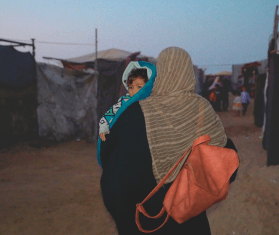Dear Friends,
Even long-time MSF veterans will tell you: The volume and complexity of emergencies in 2014 was unparalleled. Bookended by a typhoon’s aftermath in the Philippines and the ongoing West Africa Ebola outbreak, it also included war in Syria, South Sudan, and Central African Republic, among other crises. While your support assured us the financial resources needed to respond, it was challenging, to say the least.
On Ebola—we were there when it began, in March, and repeatedly sounded the alarm about the need for a broader, faster response from the international community. That was slow to develop, and the consequences were severe, as we’ve seen. No one saw this more immediately than MSF field staff in Guinea, Liberia, and Sierra Leone. We are profoundly grateful to them, our colleagues who’ve answered the call, especially the national staff.
There is risk involved in this work—be it with Ebola, in conflict zones, or in other contexts where MSF operates—and while I think MSF does well to mitigate risk, we cannot eliminate it altogether. Staff members have indeed contracted the virus in the field. Several have died. We investigate every incident to learn how it occurred and make adjustments as needed, but we also knew there was a chance that one of the field workers sent from the US could develop symptoms after returning home.
That happened in October. Dr. Craig Spencer did everything he should have done once he felt the onset of a low-grade fever; the protocols we had in place proved successful.
Public anxiety and a media frenzy ensued, however, and both were heightened when MSF nurse Kaci Hickox was forced into quarantine after landing in Newark, despite having no symptoms. Through it all, we tried to support Craig and Kaci as best we could, while also communicating transparently with the public, our supporters, and concerned field staff, and working with state and federal officials to understand the shifting, often opaque directives that were being issued.
That process continues, but Craig was treated, declared healthy, and discharged on November 11, and thus far no one else has developed symptoms upon their return. We have therefore been trying to redirect attention back to the field, to West Africa, where more than 3,000 MSF staff are doing their utmost to staunch the spread of the virus, just as teams in South Sudan and CAR and dozens of other countries are doing their utmost to deliver lifesaving medical care.
Our work continues to evolve on other fronts as well. MSF is breaking ground (for us) by taking part in clinical trials of potential Ebola treatments, as well as the first new tuberculosis drugs in 40 years. We continue to call for changes in the way research and development is carried out as well, while also challenging excessive pricing regimens for vaccines for children and advocating against policies and trade agreements that would impede access to medicines.
I’d say we were wishing for a calmer 2015, but that seems unlikely. So we will stand ready, with your support, to respond as we must, where we must, as we’ve done for more than 40 years.
Yours,
Deane Marchbein
President, MSF-USA Board of Directors




